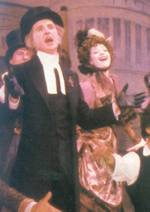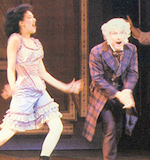Martin Wimbush Interview - part 2
Feature from 2008

Martin on stage

Ernie singing on stage
Yes, I think there was something there. He was playing the Chairman and the Chairman’s role is very much a dominant one. You have to take the stage, engage with the audience and really be very strong.
The character was played on Broadway by George Rose, a big dominant character actor who made his name playing these huge, larger than life parts. Ernie on the other hand was very contained; he liked to perform in a closed, well rehearsed, neat way. There was not much room for improvisation, everything had to be written and followed. The part, in a way, was too big for him in that sense.
It was that he couldn’t play the part, it was the way the part had to be played. It needed great energy.
Do you think he missed the security of having someone he could trust by his side; someone to joke and fool around if things went wrong?
Yes. That was the concern I think for any performer in a double act, when one partner dies. The audience were naturally concerned, naturally worried. When a performer steps out on stage for the first time there is always that first five or ten minutes where they gauge the audience and the audience gauge them.
It’s almost like a love affair, you have to become familiar, gain their trust. Eventually they know where the performer is going and the performer knows where the audience is going. Then the performer can relax, the audience relaxes and there is this connection. That is what Morecambe & Wise had as a double act.
Because I think Ernie was a bit nervous, it showed and the audience picked it up, the audience then became nervous for him. I don’t know how he could have got over that, maybe joke about it, or confront it head on. Make a statement to the audience that here he was, on his own, starting afresh and lets get on with it – that might have settled things down - made the audience think that Eric was looking down saying “Go on Ern, go for it.”
I think the audience wanted it to work, but there was something stopping it and it is very difficult to pinpoint what it was.
Do you think there was a kind of morbid fascination on the part of the audience, wanting to see how Ernie would do on his own?
Yes, I think there was. As we were going through the rehearsal period and the first night grew closer, we had an American team around us, constantly drilling us. They worked us very very hard, making sure we knew every single step and every single moment. That’s the American attitude but I think it was quite strange for Ernie to work like that. To be suddenly faced with this American production team who were very demanding must have had an effect.
How did the cast react to that kind of work ethic?
That was something we all had to adapt to as jobbing actors. It was different for Ernie. He was used to a completely different style of working and had been for over 30 years. A more gentle approach, a more easy going style to learning things, so I think he was quite intimidated by this American team.
Did the Americans know who Ernie was?
Probably not. Their attitude to everyone was; we don’t care who you are, you’ve got to prove yourself. It was a case of you’re an actor – so act, entertain me. It’s quite a brutal attitude to work with, but like I say, you have to adapt.
We had wonderful support as the first night got closer from Rupert Holmes, it was his show, he wrote the show, the music, the lyrics. He has a wonderful sense of imagination and a great sense of theatricality.
What I think the problem was, in some respects, was that when the producers went over to America to see it on Broadway, they saw an American view of music hall. Rather like the Dick Van-Dyke interpretation of a cockney, which the Americans adored.
They then transported the whole show to London and brought the American contingent with it. They thought they could just recreate the show as it had been in Broadway. It would have been better to re-invent the show for English audiences by using an English production team.
It’s the equivalent of us going to America and singing “I love Los Angles, it’s a wonderful town for me…” The Americans wouldn’t have a clue what was going on.
How was the first night?
On the first night, Rupert told us to be very careful. The audience would be full of critics and producers, people who made the show, it was going to be a very tricky night… but don’t worry!
That in itself can be difficult because as a musical, the actors have to engage the audience to make it work, and you can imagine how hard that is when most of them are not your average theatre goer wanting to have a good time. The audience is full of people making notes and watching every move, reviewing rather than enjoying.
© morecambeandwise.com 2008